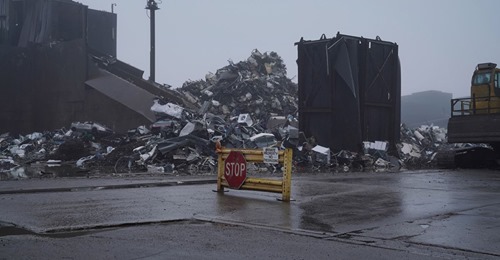The metallic odors are gone now. So are the piles of flattened cars, used appliances and twisted rebar fed almost every day into one of the last industrial polluters on the North Branch of the Chicago River.
After more than a century operating between North Avenue and Cortland Street, General Iron Industries closed for good on the last day of 2020, fulfilling a pledge its clout-heavy owners made to Mayor Lori Lightfoot a year earlier.
Workers began dismantling some of the often-troubled company’s equipment during the weekend. Semitrailers occasionally pulled up to haul away the final mounds of scrap.
Shutting down General Iron marks a hard-fought victory for Chicagoans in Lincoln Park and Bucktown who complained for years about lung-damaging bits of metal, glass and plastic drifting into their homes.

“Too many broken promises to believe this is actually happening,” said Lara Compton, one of the leaders of a North Side community group called Stop General Iron.
A sign on the company’s office door at Clifton Avenue and Kingsbury Street urges peddlers to sell their scrap at two other locations, including a site under development on the Southeast Side fiercely opposed by another group of neighborhood activists.
Members of the Southeast Environmental Task Force contend Lightfoot will perpetuate environmental racism if her administration approves the company’s move from the wealthy, predominantly white North Side to a low-income, mostly Latino neighborhood.
“Like her predecessors, Lightfoot is leaning toward doing business in a way that shuts out the community and continues to create an uneven playing field for many Chicagoans,” Gina Ramirez, a third-generation resident of the Southeast Side, wrote in a recent Chicago Tribune op-ed.
Residential yards, baseball fields and playgrounds in Ramirez’s neighborhood already are contaminated with heavy metals and toxic chemicals from other companies, including steelmakers that abandoned the area decades ago.
The proposed move of General Iron came after the Labkon family sold their company to Ohio-based Reserve Management Group in 2019. During the previous decade, family members protected their interests by spreading more than $500,000 among local politicians and hiring lobbyists close to former Mayors Richard M. Daley and Rahm Emanuel.
At least one family member, Adam Labkon, owns part of the new enterprise.
RMG contends its new facility on the Southeast Side would be the nation’s cleanest scrap shredder. Connected to the Great Lakes and the Mississippi River, it would give RMG the ability to cost-effectively ship scrap by barge to steel mills across the eastern part of the United States.
“We are looking forward to successfully completing the permit process,” the company said in a statement.
Activists on the Southeast Side contend RMG’s statements sound disturbingly familiar to promises General Iron made over the years.
They note the U.S. Justice Department and Environmental Protection Agency cracked down on General Iron three times between 1999 and 2018, later brokering legal settlements for emitting illegal amounts of pollution and handling scrap unsafely.
While RMG is continuing to build the Southeast Side facility, the Lightfoot administration admonished the company last month for submitting a woefully inadequate permit application.
Among other things, the city said in a Dec. 23, letter, RMG failed to properly detail how it will deal with polluted runoff from the site, stop loud noises from disturbing neighbors and prevent noxious odors from spreading beyond its property.
The Labkons, meanwhile, are selling 21 acres of riverfront property they own on the North Side near the upscale Lincoln Yards development. They have yet to find a buyer.
mhawthorne@chicagotribune.com
View More Stories:
https://www.chicagotribune.com/subscriptions/land-subscribe-evergreen/index-ind.html?int=nav2







